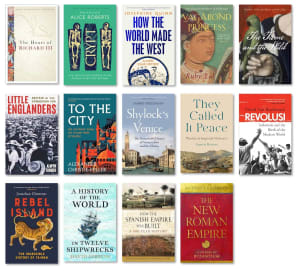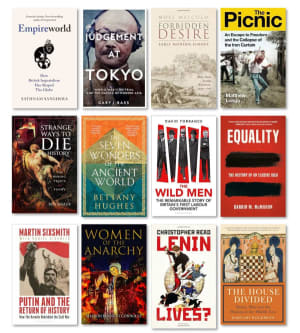In the UK when we think of twentieth century history, World War 2 tends to dominate. Great Britain, this plucky sceptred isle, standing alone against the menace of Nazi Germany. An isolated bastion of freedom, relying on a few spitfires and old duffers in the home guard to fend off the fascist hordes that surrounded us.
What we tend to forget is that at that time Britain was at the centre of a world empire that laid claim to about a quarter of the land area of the globe and a fifth of its population.
Are we the bad guys?
No doubt from the Nazi perspective they were the plucky young challengers. And why shouldn’t they aim for world domination when the British empire provided such an immediate and compelling template?1
Matthew Parker’s new book One Fine Day: 29 September 1923, Britain’s Empire on the Brink reminds us that it was only 100 years ago in 1923 that the British Empire was at its largest ever extent, having just absorbed a bunch of territories under League of Nations mandates following World War 1.
The British Empire in 1923
To get a sense of the extent of the Empire at that time, this map sets out countries today that were ruled, or at least partly ruled, by Britain.2
Source: me using Wikipedia 🙂. Top right button to enlarge map and press the finger button to pan around and zoom in. Base map from simplemaps.com.
It is a huge expanse.
Parker examines the state of the empire at that time, starting in the Pacific, and journeying West stopping off at various imperial territories.
- 🇰🇮 Ocean Island (now part of Kiribati)
- 🇦🇺 Australia
- 🇮🇳 India
- 🇲🇾 Malaysia
- 🇲🇲 Burma / Myanmar
- 🇰🇪 Kenya / East Africa
- 🇳🇬 Nigeria / West Africa
- 🇯🇲 Jamaica and the West Indies
A few decades in the life of...
The title of the book suggests that it is a “micro history” based on a single day around the world (23 September 1923) but this isn’t the case. Instead this date is used as a bookend for the histories of the different places we visit, often covering several decades.
But while One Fine Day looks backwards, it tends not to look forwards from September 1923. What we experience then is the perspective of people alive at that time, who don’t know what is coming. This was very effective in getting me into the contemporary mind-set.
Ocean island
For example the book’s first location, Ocean Island (now Banaba, part of the Republic of Kiribati) in the Pacific, is described from 1820s when it was first visited by whalers selling tobacco. Then in 1900 it was targeted for phosphate mining - the island’s soil (when chemically processed) making an incredibly rich fertiliser. The story is continued up until 1923 by which point it was officially a British possession and in danger of being totally dug up and shipped off - the islanders desperately struggling against this fate.
The history is told through the voices and experiences of people from the communities ruled by Britain. In the case of Ocean Island we hear this voice indirectly but clearly nonetheless. We also get the British settler and London perspective - which were often at odds.
The Ocean Island tale is rounded off by the story of the British Resident Arthur Grimble, who wrote popular books about the charms of life in the Pacific and how much the islanders loved him. He also left behind a damning letter which came to light decades later, in which he threatened the islanders with death and the destruction of their village if they did not hand over their remaining land to be quarried out and taken away.3)
No one remember old Marcus Garvey?
In other places we hear directly from the protagonists themselves, and One Fine Day introduces us to some memorable characters. My favourite was Marcus Garvey, born in Jamaica. Although he appears to be reasonably well known I hadn’t come across him before. Starting from nothing he built a huge following across North America, developed a number of businesses focused on benefiting black people, and declared himself President of Africa. Always a controversial figure (for example favoured the segregation of white people and black people), the impact he had was enormous.4
The rough and the smooth
One of the things that I appreciated about One Fine Day is that there is no attempt to fit the histories of these different places to a particular argument. Parker is not trying to make the case that the British Empire was a “bad thing”, neither is he trying to do the opposite and say that it was a “good thing”.
However he doesn’t shy away from the negative consequences of the Empire on many of the people ruled by it.
The colonial takeover of Kenya stuck in my mind in particular.
Colonial Kenya: a Tabula Sordida
For a long time Britain had very little to do with East Africa. But at the end of the 19th century the British developed a “rather paranoid concern” (as Parker puts it) that a rival European power could rock up at the source of the Nile in Uganda and somehow bung it up so that Egypt - another British pseudo-colony - would dry up. Thus making the Suez canal - the gateway to the British colony of India - untenable.
The solution? Take over Uganda (then the kingdom of Buganda) at the headwaters of the Nile.
The lunatic line
But Uganda is a landlocked country (see map above) so... what if you need to get there in a hurry? The next solution? Build a railway from Mombasa on the coast to Lake Victoria, across what is now Kenya.
Building the railway was initially a private undertaking but it bankrupted the company building it. The British government inherited the task of finishing it off, and the large debts that it had accumulated.
To pay off these debts a house tax was introduced in 1900. Every dwelling place in Kenya had to pay the tax. If the tax wasn’t paid the house was burned down.
Imperial logic
Alongside this, huge expanses of land were declared property of the British Crown and sold off to white settlers. As well as raising some money directly the idea was that the land would be used to grow export crops like cotton. The white settlers had no intention of working the land directly, so this meant that Kenyan Africans were forced into labouring on these farms.
Among other coercive factors: where were you going to get the hard currency to pay the house tax to prevent your house being burned down, if not by working on a colonial farm?
So Kenyan Africans were being fleeced for cash and forced into servitude, in order to pay for a mad project to stop the Nile getting bunged up, to protect Egypt, which was protecting the Suez Canal, which was the route to India, the jewel in the Imperial Crown.
The interests of the white settlers were less convoluted - they wanted to get rich at someone else’s expense.
Back in the UK, the Colonial Office was often appalled by the behaviour of the Kenyan colonists. But these good intentions at a distance did nothing to stop the bad behaviour on the ground.
Writing style
This book is a big one, there’s no avoiding it. So big that the notes section got relegated to a separate notes website by the publisher (see the Source Notes link on the left hand side).5
But Parker breaks it down into manageable bite sized chapters, and - mostly - keeps it sailing along nicely. I did find myself a bit becalmed about half-way through but the breeze picked up again after this, blowing strongly until the end.
He also does a good job of making it immediate and personal with anecdotes and snippets from the lives of ordinary people of the time.
Negatives?
I think the only negative is that there is just so much to say, that One Fine Day can feel a bit overwhelming. That said anything cut from the book would feel like a loss.
Conclusion
This is a fine book that collects together a huge range of stories from the early twentieth century, linked by the British Empire but refreshingly disparate.
Despite living in the UK the late British Empire was a mental tabula rasa for me. Matthew Parker has helped to sketch in some of the - sometimes shocking - details and has left me wanting to find out more.
For the avoidance of doubt my view is that the Nazis should not have attempted world domination. ↩︎
For example, all of Nigeria was part of the British Empire at that time. The western sliver of Cameroon was also part of the British Empire then. Both of these countries, on their present borders, have been coloured in red. ↩︎
I have massively simplified this story - the book is worth reading for this section alone. It is also interesting that Arthur Grimble’s wikipedia page is clearly in need of beefing up! ↩︎
There is a great introduction to Marcus Garvey on the BBC Great Lives program. ↩︎
This tripped me up at first as I couldn’t find anything in the book to tell me that the notes were online. ↩︎
Book details
(back to top)- Title -
One Fine Day : Britain's Empire on the Brink
- Author -
Matthew Parker
- Publication date -
September 2023
- Publisher -
Abacus
- Pages -
608
- ISBN 13 -
9781408708583
- Podcast episode -
- Amazon UK -
- Amazon US -



